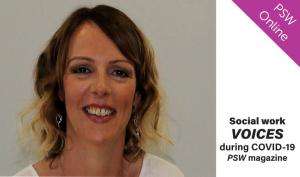What does vulnerable mean in a pandemic?

Published by Professional Social Work Magazine - 15 June 2020
When the pandemic began to really impact my therapeutic family support agency, when I realised it was more than something mentioned on the news, when the enormity of how it would change our team and the lives of the families we support hit me, the word I heard most was vulnerable.
I am a therapeutic social worker for children and families. The potential to pass the virus through family systems meant my team discussed who was vulnerable every day. All our families are vulnerable. Children need parents, especially in single parent households. Some of the parents have essential jobs, working in the health service. Some of the parents and children have health issues. Some of the families have older relatives.
Then we had to think about ourselves and our colleagues, also parents, people with health conditions, carers who are vital to our families.
We thought about safety and talked about the risks with everyone. Then lockdown happened and families had new vulnerabilities. How were they going to cope without the support of their wider families? How were the parents, on their own and poorly, going to get their shopping? How were some of our families going to be okay in housing not fit for their family’s needs? How were some families going to offer any kind of home schooling when getting children to school or through the day was hard with teachers’ support?
The notion of reaching out and protecting the most vulnerable makes sense but all the families we support have vulnerabilities. We have thought, instead, about how we help them feel safe. We have connected people with those that can assist with food, shelter and healthcare. Without these in place, people cannot feel safe. Without those basic needs being met, social work knowledge tells us we cannot support their emotional needs.
This question of how do we provide safety is at the core of what is happening. When basic needs are met, people feel supported. As we continue to connect with families, they share fears for the future about their health, income, fragile relationships and more. They are anxious and we are anxious because we are all vulnerable in these uncertain times and need to connect with others to share our fears.
The government rhetoric that vulnerable children should be in school was stigmatising and ‘othered’ those more unequally impacted. Those whose sense of safety was more fragile need to feel connection more than ever. Social workers know, and it is regularly reported in the media, this pandemic will have long lasting consequences for our children and families' mental health. Adversity impacts health and wellbeing in the long term. The poverty many families will experience will extend the inequality established by austerity.
For families, especially parents unable to work due to childcare, particularly women, those in unsuitable housing unable to access green spaces or people without electronic connectivity experiencing poverty and isolation, how will they feel safe?
As ever, being a social worker in a pandemic has meant thinking about how anxious I am about how I can support families. For many social workers, this means taking enormous personal risks which match the enormous risks being taken with the mental health of the children we try to keep safe.
Being able to offer advice and solutions comes after learning to care for ourselves so we are able to do the same for those that we connect. We do this not just because they are vulnerable but because we are all vulnerable without each other. My team and I prefer to actively choose to do all we can to keep one another and the children and families we work with safe.
Charlotte Jenkins is a therapeutic social worker and director of a not-for-profit family support agency
Do you have experiences, thoughts or feelings of social work during the COVID-19 pandemic you would like to share with Professional Social Work magazine? Click here to find out how
This article is published by Professional Social work magazine which provides a platform for a range of perspectives across the social work sector. It does not necessarily reflect the views of the British Association of Social Workers.
